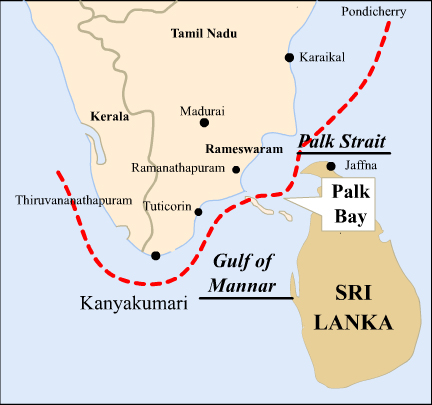Indian fishermen in Sri Lankan net - An analysis
Indian fishermen caught by SL in Palk Strait - An analysis
- The story: The arrest of 68 Tamil Nadu fishermen by the Sri Lankan authorities in December 2021, and the impounding of 10 boats for poaching in territorial waters have again raised concerns about the fate of the men. What is the reason for the Palk Bay fishing dispute? Is it that intractable that despite years of efforts, flashpoints keep getting created?
- Aalysis: Sri Lanka has complained for a long time that Indian trawlers violate the IMBL (International Maritime Boundary Line) and fish in Lankan waters affecting the livelihood of Sri Lankan fishermen. The issue between the two countries has been the use of bottom trawlers by the Tamil Nadu fishermen.
- This practice has been banned in Sri Lanka on the ground that trawling damages the marine ecosystem.
- When SL banned fishing after civil war broke out in the Jaffna peninsula in the 1980s, Indian fishermen found greater access to catch in the Lankan waters.
- With Lanka lifting the ban after 2009 and its boats and crews demanding their share of the sea, the catch has reduced forcing the fishermen to use bottom trawlers.
- Fishing regulation: The State government has control up to 12 nm from the base line, while the rest is vested with the Union government. As per the Tamil Nadu Marine Fisheries Regulation Act, 1983, fishing is permitted on country craft boats within 5 nm and on mechanised vessels between 5 and 12 nm. Mechanised vessels with trawlers are only to be used between 5 am and 9 pm.
- Maritime zones: These are -
- Territorial zone - 12 nm from shore baseline
- Contiguous zone - 12 nm from end of territorial zone
- Exclusive Economic Zone (EEZ) - 200 nm from end of territorial zone
- High seas - from end of the Exclusive Economic Zone
- Measures taken: Many efforts were made
- Joint Working Group - New Delhi and Colombo had instituted a Joint Working Group (JWG) to address issues related to fishing in 2016, following a 2+2 initiative.
- The Palk Bay scheme - It was launched in 2017 under the umbrella of Blue Revolution to replace 2,000 bottom trawlers with deep-sea fishing boats. It is financed by the Union government (50%), the state Government (20%) with beneficiary participation (30%). It will be applicable to vessels costing upto Rs. 8 lakhs.
- Marine Fisheries Bill- It aims to protect Indian fishermen if there is any illegal activity by a foreign fishing vessel. It proposes to only grant licenses to vessels registered under the Merchant Shipping Act, 1958, to fish in the EEZ.
- PMMSY - The Pradhan Mantri Matsya Sampada Yojana (PMMSY) is designed to address critical gaps in fish production and productivity, quality, technology, post-harvest infrastructure, modernisation, strengthening of value chain, establishing a robust fisheries management framework and fishers’ welfare. It is an umbrella scheme with two separate Components namely - Central Sector Scheme and Centrally Sponsored Scheme. It will be implemented in all the States and Union Territories for a period of 5 years from FY 2020-21 to FY 2024-25.
- Challenges:
- Failure of the Palk Bay Scheme - The component of cost to be borne by the fishermen accounting for 30% of the unit cost of Rs. 80 lakh is unbearable by the fishermen.
- Overfishing - The overcapacity on the Indian side and the building scarcity in the Palk Strait due to overfishing has not yet reduced. Many discussions at the levels of the fishermen and the governments of the two countries have not led to any tangible improvement in the situation.
- Reduction in fish stock - Over the years, fishermen on both country craft boats and mechanised vessels have moved far beyond the 12 nm mark, as the availability of fish reduced in the terrestrial sea.
- Cases of deaths - Fishermen from Tamil Nadu getting arrested and released later has become a routine affair but there have been cases of deaths. In January 2021, four fishermen from Ramanathapuram district lost their lives after their vessel collided with a Sri Lankan naval craft.
- Road ahead: The priority now for India is in securing the swift release of the 68 fishermen. Regarding the Palk Bay scheme, apart from increasing the unit cost at least to Rs. 1.2 crore, the governments must increase their share of subsidy. The government must work out an economic package to buy out excess capacity so that the confrontation in the seas ends and fishing can be a sustainable vocation in the Tamil Nadu coast. It should motivate the fishermen to adopt sea cage farming and sea/ocean ranching, which were all covered under the PMMSY.
- EXAM QUESTIONS: (1) What have been the historical reasons for India-Sri Lanka relations being strong, despite many hiccups? Explain. (2) In what way can India ensure a better livelihood for its fishermen, in light of changing climate and depleting fish stocks?
* Content sourced from free internet sources (publications, PIB site, international sites, etc.). Take your own subscriptions. Copyrights acknowledged.









